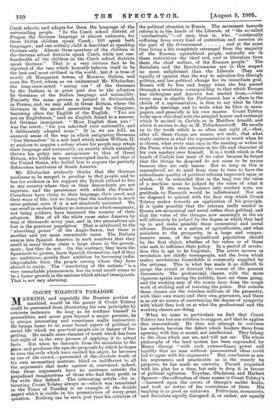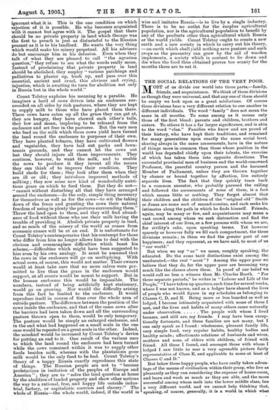COUNT TOLSTOY'S PARADISE.
MANKIND, and especially the Russian portion of mankind, would be the gainer if Count Tolstoy could be prevented from illustrating his own principles by concrete instances. So long as he confines himself to generalities, and never goes beyond a major premise, he is always interesting and sometimes really instructive. He brings home to us some broad aspect of political or social life which we practical people are in danger of for- getting. He recalls some element of truth which has been lost sight of in the very process of applying it to actual facts. But when he descends from the mountain to the plain, and produces the specific proposals by which he hopes to cure the evils which have excited his anger, he becomes as one of the crowd,—persuaded of the absolute truth of his own momentary nostrum, blind or indifferent to all the arguments that make against it, convinced, indeed, that these arguments have no existence outside the prejudiced imaginations of those who find their profit in the evils they defend. The interesting article—for in- teresting Count Tolstoy always is—which was translated in the Times of Tuesday is an example of the double upoct wilich is visible in his presentation of every great question. Nothing can be more just than.'his criticism of the political situation in Russia. The movement towards reform is in the hands of the Liberals, of "the so-called intellectuals,' "—of men, that is, who, "continually suffering from every kind of restriction and coercion on the part of the Government and at the same time living a life completely estranged from the majority of the Russian agricultural people, naturally see in these restrictions the chief evil, and in liberation from them the chief welfare, of the Russian people." The Socialists and the Revolutionaries are in this respect no more enlightened than the Liberals. They are equally of opinion that the way to salvation lies through politics, and has political change for its immediate goal. Russia will be free and happy when she has passed through a revolution corresponding to that which Europe has undergone and America has started from,—when every man is eligible for Parliament, has a share in the choice of a representative, is free to say what he likes in public meetings and to write what he likes in news- papers, and generally is his own master. Count Tolstoy looks upon this ideal with the mingled horror and contempt which it excited in Carlyle or in Matthew Arnold, and which it excites to-day in M. Pobiedonostzeff. He recalls us to the truth which is so often lost sight of,—that, after all, these things are means, not ends ; that what really matters is what the representative is worth when he is chosen, what every man says in the meeting or writes in the Press, what is the outcome in his life and character of his own mastery over himself. It is a truth which in the hands of Carlyle lost most of its value because he forgot that the things he despised do not cease to be means because they are only means. But so long as this is remembered, we do need from time to time to have the subordinate quality of political reforms impressed upon us afresh,—to be reminded that in the long run the value of a machine must be judged by the value of what it makes. If the steam hammer only cracked nuts, our gratitude to Nasmyth would be infinitesimal. Nor are we disposed to quarrel with the first step which Count Tolstoy makes towards an application of his principle. It is quite possible that the reforms really needed in Russia are economical and social rather than political, and that the value of the changes now seemingly in the air will ultimately be judged by the degree in which they lead. up to and make possible these economical and social reforms. Russia is a nation of agriculturists, and what ministers to the prosperity, in a large and compre- hensive sense, of the agricultural population should be the first object, whether of her rulers or of those who seek to influence their policy. In a period of revolu- tion this is apt to be forgotten. The active movers in revolution are chiefly townspeople, and the force which makes revolutions formidable is commonly supplied by the artisans. This is what has made it so difficult to gauge the extent or forecast the course of the present discontents. The professional classes, with the more vigorous spirits among the nobility, have set them going, and the working men of the towns have done the rough work of striking and of resisting the police. But outside these classes are the voiceless millions of the peasantry, with their own wants and their own grievances, and there is as yet no means of ascertaining the degree of sympathy with which they look on at what the professional and the working classes are doing.
' When we come to particulars we find that Count Tolstoy has but one solution to suggest, and that he applies this remorselessly. He does not attempt to convince his readers, because the defect which hinders them from agreeing with him is moral, not intellectual. They belong to the class which can see, and will not see. The whole philosophy of the land system has been expounded by Henry George "with such extraordinary power and lucidity that no man without preconceived ideas could fail to agree with his arguments." But, conclusive as are his arguments, and practicable as is the remedy he proposes, be has made no converts. Parnell coquetted with his plan for a time, but only to drop it in favour of political agitation. Toynbee, Gladstone, and Herbert Spencer—the collocation of these names is Count Tolstoy's —fastened upon the errors of George's earlier books, and took no notice of his corrections of them. His teaching is as good as unknown. Politicians, economists, and Socialists equally disregard it, or rather, are equally ignorant what it is. This is the one condition on which rejection of it is possible. He who becomes acquainted with it cannot but agree with it. The gospel that there should be no private property in land which George was the first to preach is just as distasteful to the Russian peasant as it is to his landlord. He wants the very thing which would make his misery perpetual. All his advisers do but encourage him in his delusion. Even when they talk of what they are pleased to call "the agrarian question," they refuse to see what the words really mean. Instead of proclaiming that private property in land should be abolished, they employ "various patchings and palliatives to plaster up, bush up, and pass over this essential, ancient and cruel, this obvious and crying, injustice, which is awaiting its turn for abolition not only in Russia but in the whole world."
Count Tolstoy explains his meaning by a parable. He imagines a herd a cows driven into an enclosure sur- rounded on all sides by rich pastures, where they are kept to supply milk to those who have placed them there. These cows have eaten up all the grass they can get at, they are hungry, they have chewed each other's tails, they low and moan, imploring to be released from the enclosure and set free in the pastures. But the very men who feed on the milk which these cows yield have turned the land round the enclosure to purposes of their own. They have planted tobacco, they have cultivated flowers and vegetables, they have laid out parks and lawn- tennis grounds, and they cannot let the cows out lest they should injure all these improvements. They continue, however, to want the milk, and to enable the cows to produce it they invent all the means they can think of to improve their condition. They build sheds for them ; they look after them when they are ill or old ; they introduce improved methods of milking ; they sow some new kind of wonderfully nutri- tious grass on which to feed them. But they do not- " cannot without disturbing all that they have arranged around the enclosure—do the only, simple thing necessary for themselves as well as for the cows—to wit the taking down of the fence and granting the cows their natural freedom of using in plenty the pastures surrounding them." Throw the land open to them, and they will find abund- ance of food without those who use their milk having the trouble of providing it. Abolish private property in land, and so much of the misery of the world as comes from economic causes will be at an end. It is unfortunate for Count Tolstoy's contemporaries that his contempt for those who differ from him no longer allows him to deal with the obvious and commonplace difficulties which beset his schenae,—difficulties which might have been suggested to him even by his own analogy. It must be assumed that the cows in the enclosure will go on multiplying. With actual cows, of course, this would not matter. Their owners would- at least take care that no more calves were per- mitted to live than the grass in the enclosure would support, at all events would be meant to support. But in the human enclosure this would be impossible. The numbers, instead of being artificially kept stationary, would go on growing. Nor would the difficulty arising from this fact be limited to the enclosure. It would reproduce itself in course of time over the whole area of outside pasture. The difference between the position of the cowd inside the enclosure, and that of the same cows after the barriers had been taken down and all the surrounding pasture thrown open to them, would be only temporary. The pasture would be simply an enlarged enclosure, and in the end what had happened on a small scale in the one case would be repeated on a great scale in the other. Indeed, the mischief would be increased by Count Tolstoy's device for putting an end to it. One result of the various uses to which the land round the enclosure had been turned while the cows remained within it was to supply other foods besides milk, whereas with the plantations gone milk would be the only food to be had. Count Tolstoy's theory of a happy Russia exactly reproduces this state of things. The Russian people are not to "become proletarians in imitation of the peoples of Europe and America " ; they are to "solve the land question at home by the abolition of landed property and show other nations the way to a rational, free, and happy life outside indus- trial, factory, or capitalistic coercion and slavery." The whole of Russia—the whole world, indeed, if the world is wise and imitates Russia—is to live by a single industry. There is to be no outlet for Me' surplus agricultural population, nor is the agricultural population to benefit by any of the products other than agricultural which Russia or the world yields. Count Tolstoy ought to create a new earth and a new society in which to carry out his theory, —au earth which shall yield nothing save pasture and such crops as the peasantry can grow by the aid of wooden implements, a society which is content to lie down and die when the food thus obtained proves too scanty for the mouths there are to eat it.







































 Previous page
Previous page